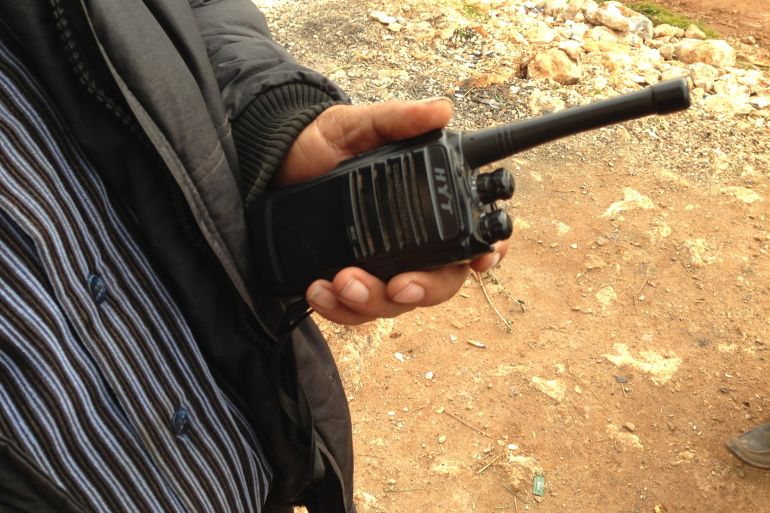Walkie-talkies as lifeline in wartime Syria
Hand-held transceivers help residents to communicate and also keep track of impending attacks in absence of other means.

Jabal al-Zawiyah, Syria – Abu Rashad’s sons have both gone to the frontline to fight Syrian President Bashar al-Assad’s forces in the suburbs of Idlib city.
Their worried father is sitting at the doorstep of his shop in the town of Ferkiya, holding near his ear a walkie-talkie that keeps transmitting messages separated by beeps.
“Get into the building, a rocket is coming,” a voice from the transceiver says. Abu Rashad’s breathing races. Forty seconds later, another message: “The route is clear.” Abu Rashad takes a sigh of relief.
The frequency of his device has been set up so he can listen to the communication between fighters on the ground, including warnings from those monitoring government forces’ movements.
He also gets news about the rebels’ advances, and sometimes announcements of casualties among their ranks.
|
“You have no idea how helpful this is. The information we receive has allowed us to predict where the air strike may hit and this has helped us save lives.” – Abu Mohammad, FSA commander |
“This is the only way for me to know how my sons are doing,” he says with tears in his eyes.
“There have been no phone lines or electricity to watch the developments on television for the past two months.”
Ferkiya, a rebel-held town of about 5,000 residents, endures sporadic shelling by regime forces and lacks state services. Two weeks ago, a missile fell in an olive field just metres away from Abu Rashad’s shop, leaving a three-metre deep cavity in the ground.
Nonetheless, Abu Rashad keeps his semi-stocked store open every day.
It has become a meeting point for locals who come to sit around the walkie-talkie to hear real-time news from the battlefield. They react as if they were listening to a football game: they cheer upon hearing that a tank has been destroyed while swearing at Assad, and pray when rebels get injured or killed.
Abu Rashad says his son brought him the walkie-talkie from Antakya in Turkey for $120. He was one of the first civilians to hold one.
“There were only 20 of devices in Idlib province at the beginning. They were limited to the fighters,” Abu Mohammad, a military commander of an opposition battalion, tells Al Jazeera. “But there are now thousands of owners, more than 5,000.”
Lifeline for residents
As traditional means of communication are lacking, the walkie-talkie has become a lifeline for residents. They are warned if regime forces are nearing their town or if shells may start falling.
Medics in the local clinic also have a walkie-talkie to receive calls from injured civilians in remote areas with no medical centres. Some electricity workers also have transceivers to take orders from people who need repairs of their electricity generators.
But the battlefield remains where the walkie-talkie is mostly used.
Rebels do not only use it to connect with each other. They have also been able to penetrate the regime forces’ communication to track their movements.
Spying on the army during the battle for the strategic town of Maaret al-Numan three months ago helped fighters overrun a major checkpoint, rebels tell Al Jazeera.
“The army was heavily firing rockets at our positions. We were on the verge of withdrawing,” Ibrahim, a rebel in Idlib, says. “But then, through the walkie-talkie, we heard a regime soldier saying ‘our rocket fell back on us’. We took advantage of this and attacked the checkpoint.”
Abu Mohammad says the transceivers some opposition battalions possess can be used to intercept communication between pilots flying regime fighter jets and the central command.
“You have no idea how helpful this is. The information we receive has allowed us to predict where the air strike may hit and this has helped us save lives,” the commander says.
But he adds that the soldiers generally speak in a coded language, making it hard to understand most of what they say.
“It seems that when the soldier in Maaret al-Numan screamed that the rocket misfired, he said it spontaneously,” Abu Mohammad says.
The rebels also try to speak in code because they know that the army is spying on them, too.
While Abu Rashad does not understand most of what is being said, he keeps his walkie-talkie on for hours.
Few visit his shop to buy clothes these days. “But a lot of customers come for the walkie-talkie. Of course, it’s for free,” he says and laughs.